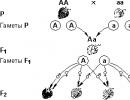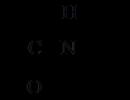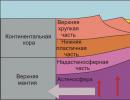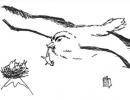Indefinite article A (AN). Rules for using the definite and indefinite articles in English The indefinite article a an in English
In English - unlike Russian - special words - articles - are widely used. The article and the rules for its use in English are presented below in examples to facilitate the perception of the necessary material. In English there are two articles: the definite the and uncertain a (an) . The article is generally placed only before nouns. The indefinite article applies exclusively to singular countable nouns, but the definite article can be applied to various singular and plural nouns, whether they are countable or not.
First, let's remember in what cases the article is not used. The article is not used if the noun is preceded by (one, two, six, etc), a possessive or (this, that, my, our etc.), another noun in the possessive case (my father's, Mary's etc.), or the negation “no” (Not not!). Examples:
- My room is not big, but comfortable - My room is small but comfortable.
- There are two boys in the yard - there are two boys in the yard.
- I have no brother - I don’t have a brother.
Google shortcode
Note: if a noun in the possessive case functions as an adjective, the use of an article is possible, for example: Paul is a man's name(male name). Paula is a woman's name(female name). It's a children's bicycle(children bicycle).
The article is not used with uncountable nouns denoting an indefinite amount of substance or an abstract concept:
- I don’t like tea, I prefer coffee. — I don’t like tea, I prefer coffee ( Tea coffee- at all)
- Friendship is one of the most important things in my life. — Friendship is one of the most important things in my life (friendship is an abstract concept)
The article is not used with names of sports:
- I am fond of football, and my sister prefers badminton. — I love football, and my sister prefers badminton.
Also, the article is not used with proper names (except for some geographical names, which will be discussed below).
Indefinite article "a"
The indefinite article is "a". “an” is not an independent article, but an indefinite form that is used before nouns that begin with a vowel sound: an apple, an orange.
- The forms a and an are remnants of the Old English word for "one", so The indefinite article is used only with singular nouns.
The indefinite article is used in the following cases:
- When the item is mentioned for the first time. For example, I live in a house.
- When designating a profession or occupation. For example, She is a teacher. My friend is a student.
- After: This is, That is, It is, There is. For example, This is a computer. There is a rose in the vase.
- If an adjective characterizing it is used with a noun, in such cases the article is placed before the adjective. Example: This is a flower. This is a red flower.
- Remember the use of the indefinite article in sentences of the following type
- What a beautiful color!
- What a tasty cake!
- What a good girl!
The definite article "the"
The definite article is used in the following cases:
- If we are talking about a specific subject or subjects (both singular and plural), which we have already talked about, or understand from the context what we are talking about. For example, Yesterday I saw a film. The film was not interesting. / I know all the people in this photo.
- With items that are one of a kind - Thesun, thewind, themoontheearth
- After . For example, There is a cat in front of the monitor.
- C – the smallest – the smallest, the quickest – the fastest
- C, for example: the first book, the fifth floor (BUT: if the ordinal number indicates a number, the article is not used: Lesson 7, Bus 15, page 45)
- With cardinal directions: In the north; in the south; in the east; in the west
- With the surname - if we are talking about the whole family - the Ivanovs - Ivanovs, the Smiths - Smiths
- In stable phrases: In the morning; in the evening; in the afternoon; to the cinema/theatre; to the shop/market; at the cinema/the theater; at the shop/the market
The article is usually used. There are two types - uncertain And definite- the Indefinite and Definite articles.
In some cases the article is missing.
Indefinite article ("A" or "an") is used only with a singular noun when talking about an object or concept that is not specified (not highlighted) by the context or situation or is named in speech, in the text for the first time, i.e. We don't know anything specific about this subject.
Form "A" used before consonants "an"- before vowels.
Compare:
a table an apple
a dictionary an orange
a horse an hour
Compare:
I am a teacher.
I'am a teacher.
We are teachers.
We are teachers.
The indefinite article is placed before the name of the profession, type of activity. A noun with an indefinite article carries a concept - one of an object, gender, concepts, categories, etc.
Definite article. Definite article "the" used in cases where a specific, already known or already mentioned object or concept is spoken of. The definite article is also used in all cases when an object or concept is specified by context or situation. The definite article is used with a noun in both singular and plural.
Compare:
The book you are asking for is on the table.
The book you are asking about is on the table.
The books you are asking for are on the table.
The books you are asking about are on the table.
Abstract and material nouns are usually used without an article.
For example:
The price of gold is rising.
The price of gold is rising.
In cases where abstract and material nouns are used in a concrete sense and denote a certain quantity or quality, these words are preceded by a definite article. For example:
The gold of this ring is very old.
The gold of this ring is very old.
Without an article, the following are used: proper names, names of countries, cities, streets, if they perform the functions of nouns in a sentence.
For example:
Henry lives in New York city on the corner of Broadway and 72nd Street.
Henry lives in New York City on the corner of Broadway and 72nd Street.
But if the names of countries, cities, streets, or proper names are used as a definition, then they are preceded by a definite article.
Compare:
Helsinki is the capital of Finland.
Helsinki is the capital of Finland.
The Helsinki agreement was signed on September 1, 1975
The Helsinki Agreement was signed on September 1, 1975.
If the name of a country contains a definition or attributive word, then it is used with the definite article.
For example:
the United States of America.
USA.
the Soviet Union.
Soviet Union.
the United Kingdom.
United Kingdom.
You should remember the names of some countries, cities, localities, which, as an exception, are always used with the definite article:
the Netherlands Netherlands
the Ukraine Ukraine
the Congo Congo
the Hague Hague
the Crimea Crimea
the Caucasus Caucasus
The names of rivers, seas, oceans, mountains (mountain ranges) and islands in English are usually used with the definite article.
For example:
the Volga River Volga
the Urals Ural (mountains)
the Atlantic Ocean Atlantic Ocean
the North sea North Sea
The article is not used if the noun is preceded by a proper name in the possessive case or a possessive pronoun.
For example:
John's house Johnson's house
my friend's house my friend's house
my book my book
our house our house
In this lesson we will consider the topic “Articles in English”. Let's study what articles exist and the basic rules of use in constructions. The analysis is carried out at a level understandable for children and adults.
The use of articles together with nouns in English is a rather voluminous topic, so you should be patient.
In English, the article (The Article) is the main definition of nouns. When constructing a sentence, the first thing they start with is thinking about articles, the speaker defines a definite or indefinite noun and then puts the articles. In other words, we are talking about something specific or something general. There are no articles in the Russian language, which is why this topic causes certain difficulties for many.
When composing a construction in English, the article is used in almost all cases. There are:
- The Definite Article or the definite article to which it refers The;
- The Indefinite Article or indefinite article, which refers to an And a.
We will study 3 cases of using the article - the use of the indefinite, definite article and cases when the article is not used at all in the construction.
Definite Articles in English (The Definite Article)
This part of speech has only one form, the. From a grammatical point of view, it comes from the demonstrative pronoun “that - that”.
- The definite article The Definite Article is used in a sentence when talking about an object that has already been talked about or in cases where the interlocutor understands what the conversation is about.
For example, Please show me the book. - Show me this book, please. - This part of speech is also used in a sentence when interlocutors talk about an object that is one of a kind.
For example, The sun is in the sky. - The sun is in the sky. - applies in all cases when interlocutors talk about a musical group, newspaper, cinema, restaurant.
For example, The Beatles - The Beatles. - The name of nationality, when not talking about someone specific, but generalizing all representatives of the clan, is used with the part of speech in question.
For example, the Americans. - Americans. - The definite article is used in some phrases.
For example, at the cinema/ the theater - to the cinema/theater. A stable design was used here. - If a proper name contains the words kingdom (kingdom), union (union), republic (republic), this article is used together with them.
For example, The United Kingdom - United Kingdom. - This part of speech is used in sentences after prepositions of place.
- If there is a construction “next, last + some time period,” we put this article in front of the entire construction.
For example, the next day - the next day.
For example, There is a cat in front of the monitor. – There’s a cat in front of the screen. - If we are talking about the whole family, then the article in question is also placed before the surname.
For example, The Petrovs are at home. - Petrov's houses. - objects are also used in construction with the part of speech in question.
For example, the Arctic - Arctic and the Alps - Alps.Attention, the article is not used in the names of countries, streets, airports, islands.
- If a proper name is expressed by a title and after it there is such a meaning of, the article in question is used.
Example, The Prince of Wales - Prince of Wales. - In English, as in Russian, there is an adjective that is used without a noun, but denotes a group of people. This form should also be preceded by this part of speech .
For example, The old - old people. - If the construction contains a superlative adjective, articles definite are also used before it.
Example, the quickest - the fastest. - The is used whenever there is an "of" before the noun.
For example, The Tower of London - Tower in London. - With cardinal points, this article is always used in the design.
For example, the Northern part of our country - the north of our country. - If the sentence contains the word only (meaning only), then here we also use the article in question.
For example, She was the only beautiful woman in his life. - She was the only beautiful woman in his life. - And the last case of using articles is before an ordinal number.
Example: We are on the fourth floor. - We're on the fifth floor.
This article in question is used with nouns used in the singular and plural.
Indefinite article
Views: 1,205
Indefinite articlein English it has two forms -a And an. This article comes from the numeralone - oneand therefore is used with singular countable nouns.There is no indefinite article in the plural and is not replaced by another qualifier. Forma[ə]is used before words beginning with a consonant, and the forman [ən]used before words beginning with a vowel sound.
Use of the indefinite article a/an
At the first mention of the subject | A man is waiting for you. A man is waiting for you. (some kind) |
If you can replace the article with the word “one” | A packet of biscuits, please.One pack cookies, Please. |
Any object from a number of similar ones is meant | Give me a ruler! I want to draw a straight line.Give me (any) ruler. I want to draw a straight line. |
With a noun preceded by a descriptive adjective | It was a boring, tedious movie.It was a boring, tedious movie. |
In the nominal part of a compound predicate | He is an engineer. He engineer. She is a student. Shestudent. It's a big city. It is a big city. |
The subject acts as a representative of its entire class | An elephant has got a long trunk.U elephant long trunk. |
In stable combinations like what a.. | What a lovely day! What a beautiful day! |
Before the words such, quite, rather, most (meaning “very”) | He is quite a young man. He is quite a young man. |
Cathedral have something/have got something | I have (got) an orange.U me There is orange . |
Cathedral there is ( there was or there will be ) | There is a subway in New York.New York has a subway. Join us onFacebook! |
Usually articles are not translated into Russian. However, in rare cases the context requires the translation of the indefinite article into words some, any, one of), and a certain one - that (same) or this one (the one):
She's murmured a name and the name was not John. - She whispered some name, And this name is was not John.
Let's consider three cases: when an indefinite or definite article is used before a noun, and when it is not used.
Indefinite article
Indefinite article a (an) came from the numeral one (one), so it is used only with singular nouns.
When changing a singular number to a plural, the article is omitted, and if a certain quantity is implied, then a pronoun is put instead of the article some:
Give me a book. - Give me books.
Give me an apple. - Give me some apples.
The indefinite article has a variant A, if it comes before a noun starting with a consonant: a s student; and option an- before a noun starting with a vowel: an a pple.
A noun with an indefinite article represents the name of an object in general, rather than the name of a specific object. For example a student evokes an idea of a student in general, that is, of a student of a higher educational institution, but not of a specific person.
The meaning of the indefinite article can be expressed in Russian with words such as one, one of, some, any, some, every, any, each.
Rules of use
When it is possible to substitute before a noun according to its meaning some kind, any, one of:
There is a pen on the table. — There is a (some undefined) pen (one of the class of pens) on the table.
A child can understand it. - (Any) child can understand this;
When the value is saved one:
Wait a minute! - Wait one minute!
The indefinite article is used with singular countable nouns. Not used in the plural, sometimes replaced by indefinite pronouns some (several) any (any, everyone).
If there is a definition before a noun, then the article is placed before this definition: a story(story) an interesting story(interesting story).
Definite article
The definite article has a single form the and comes from the demonstrative pronoun that(That). It is used with nouns, both singular and plural.
Article the pronounced in two ways:
- [ðǝ] before nouns that begin with a consonant: the student[ðǝˊstju:dǝntJ;
- [ðɪ] before nouns that begin with a vowel: the evening[ðɪˊɪ:vnɪη].
The definite article is used:
When in front of a noun you can put this(most) or That(most):
That is the house that Jack built. - This is the house that Jack built.
Before singular nouns:
the sun - the sun;
the moon - the moon.
Before adjectives in the superlative degree:
the cleverest boy - the smartest boy;
the most difficult question - the most difficult question.
No article
The indefinite article is not used: before nouns in plural: an article - articles.
Real nouns uncountable: water (water), salt (salt), tea (tea)- nouns that cannot be counted, for example, you cannot say: three waters.
The article is not placed before the noun when it is used in the abstract sense:
Man is the head but woman is the neck. - The man is the head, the woman is the neck.
Therefore, abstract and real nouns are most often used without an article. But if these nouns are used in some specific meaning (as a part of a substance, a shade of feeling, a certain quality of a phenomenon), then they are used with a definite or indefinite article in accordance with the above rules:
Light was coming into the room from somewhere. — Light penetrated the room from somewhere.
Soon he saw a light in the distance. — Soon he saw in the distance some kind light.
The light was faint and uncertain. — This the light was weak and uncertain.
You may buy butter and bread in a shop. — You can buy butter and bread in any store.
The butter was bought in the nearest shop. — This the oil was purchased at a nearby store.
A coffee without bread can never serve as breakfast. — Any Coffee without bread cannot serve as breakfast.
Even proper names obey these rules:
Is that the John I knew many years ago? - Is this really the same one The John I knew years ago?
Florence will never, never, never be a Dombey. - Florence will never one of Dombey.
Using articles with other determiners
The indefinite article is used after words such- such, rather- enough, quite- at all, as- in quality, as well as after what(in exclamatory sentences) and half- half:
What a nice day! - What a beautiful day!
It’s rather a long way to the village. — It’s quite a distance from the village.
The definite article is used:
After
- pronouns both- both and all- All:
All the stories were interesting. — All the stories were interesting.
- phrases most of- majority, some of- some , many of- many , none of- none of:
Most of the gentlemen looked angry. — Most of the gentlemen looked angry.
Before in words: same- the same, wrong- not the one right- That, very- exactly that, only- the only one, next- next, last- last:
You are the very person I wanted. “You are exactly the person I need.”
If the word next used in the meaning future, a last - last, then they are used without articles and prepositions.
Compare:
What is the next question? - What will be the next question?
I"ll come here next year. - I will come here next year.
Note!
With other qualifiers such as possessive and demonstrative pronouns, as well as denial no articles are not used:
There is no book on the table. — There is no book on the table.
She puts on her hat and coat. — She puts on a hat and coat.
The use of articles with proper names
Proper names are used either with a definite article or without an article. Study the following table:
|
Semantic field |
With article the |
Without article |
|
Water spaces |
Rivers, seas, oceans, straits, bays - The Thames, the Atlantic Ocean, the Black Sea, the English Channel |
Lakes - Lake Ontario |
|
Mountain systems – The Urals |
Individual peaks - Everest |
|
|
Island Groups - The Bermudas |
Selected islands - Sumatra |
|
|
Names of continents, parts of the world, capes - Eurasia, Europe, Cape Horn |
||
|
States |
Names of states containing words denoting government structure - Union, State, Republic, Kingdom: The United States of America, The United Kingdom of Great Britain and Northern Ireland, The Republic of France |
Names of states without designation of government structure - America, Great Britain, France |
|
Printed publications |
Published in English-speaking countries - |
Published in all other countries - Moscow News |
|
The whole family - The Smiths - The Smiths. The Petrovs |
One person - Smith, Petrov |
|
|
Titles |
Hotels, ships, planes - The Metropol, |
Names of streets, squares, cities - Trafalgar Square |
Exceptions: The Hague - The Hague, The Netherlands - The Netherlands, The Crimea - Crimea, The Ukraine - Ukraine, The Caucasus - Caucasus, The Congo - Congo, The Strand - Strand (street in London).
Rules for using the articles a, an and the in English
Let's look at some more examples together and establish the rules for using articles in English.
Indefinite article
The indefinite article is used before a noun when it only names an object, classifies it as a representative of a certain type of object, but does not specifically highlight it.
a table - a table (namely a table, not a chair) a chair - a chair.
When mentioning an object or person for the first time
That's a pretty girl. - Beautiful girl.
In a generalized meaning: a noun with an indefinite article in this meaning means: any, everyone.
A cow gives milk. - Any cow gives milk.
With professions:
My Dad is a Doctor. — My dad is a doctor.
She "s an architect. - She is an architect.
With some quantity expressions:
a pair - a pair, a little - a little, a few - several.
In exclamatory sentences: before a singular countable noun after the word what.
What a beautiful day! - What a wonderful day!
What a pity! - What a pity!
Use of the definite article
The definite article is used if the object or person in question is known to both the speaker and the listener (from the context, the surrounding environment, or as previously mentioned in this speech).
It is a chair
The chair is at the table - the chair is near the table
Try putting the word this or that in front of the noun. If the meaning of what is being expressed does not change, then the definite article must be placed before the noun, and if it changes, then the indefinite article must be placed before the singular noun (if it is countable), and not at all before the plural noun.
Re-mentioned, when it is clear from the previous text what we are talking about:
The girl was beautiful. — (This) Girl was beautiful.
Clear on the situation, when it is clear what/who is meant:
The lesson is over. - The lesson is over.
Having an individuating definition, that is, a definition that distinguishes this person or object from a number of similar ones.
- Definition, n calling sign:
This is the house that Jack built. - This is the house that Jack built
- Expressed as an adjective in the superlative form
This is the shortest way to the river - This is the shortest way to the river
- Expressed as an ordinal number
He missed the first lecture. — He missed the first lecture
- Definition expressed by proper noun
the Bristol road - the road to Bristol.
- Definitions expressed in words:
The stop next is ours. - The next stop is ours.
Before nouns one of a kind:
the sun - the sun
the moon - moon
the Earth - Earth
the floor - floor (one in the room)
the sea - sea (the only one in the area)
Before adjectives and participles turned into nouns with a plural meaning:
the strong - strong, the old - old people, the young - youth,
Absence of article (zero article)
If there is a pronoun before a noun or nouns in the possessive case.
My room is large - My room is large.
A noun is used without an article in the plural in the following cases: When in the singular in front of him there would be an indefinite article:
I saw a letter on the table. — I saw a letter on the table.
I saw letters on the table. — I saw letters on the table.
Uncountable real nouns.
water water, milk milk, chalk chalk, sugar sugar, tea tea, snow snow, grass grass, wool wool, meat meat and others.
Uncountable abstract nouns (abstract concepts).
weather weather, music music, power strength, knowledge knowledge, art art, history history, mathematics mathematics, light light, love love, life life, time time
I like music - I love music.
But at the same time, some abstract nouns that express a type of quality or state can be used with the indefinite article.
He got a good education. He received a good education.
In English, plural nouns may be preceded by a definite article, the pronoun some (any), or the determiner may be absent.
If one of the words can be placed in front of a Russian noun: a few, some, some, some the corresponding noun in an English sentence is preceded by the pronoun some (any).
If none of these words can be placed before a Russian noun, then there is no determiner before the corresponding noun in an English sentence.
I bought some apples yesterday - I bought apples yesterday ( some, some apples)






